How To Lose Weight & Increase Energy By Switching To Mushroom Coffee
[This is a guest post from Megan Adolph from www.WholisticWanders.com about the benefits of switching to mushroom coffee. She shares some great tips and information for anyone interested in improving their health and losing weight.]
I have learned over time and from experience, the dramatic effects coffee has on my body.
Looking back, I couldn’t live without coffee in college; I loved everything about it, the taste, smell, and energy it produced.
Then, I began to pay attention to how my body was feeling and responding to my caffeine intake.
I always wondered why I would get jittery, nauseous, or become exhausted later in the day and find myself searching for more caffeine. This was my body’s way of telling me: “HEY! There’s a problem here!”
I never even realized how much of a problem there was with my caffeine consumption until college. During one of my courses, I was performing an exercise test to monitor my heart rhythm, etc.
My professor, at the time, asks me: “Did you know you have an irregular heartbeat?” Confused and unaware of my irregular heartbeat, I later found out it was due to my caffeine consumption.
That is the moment when the problem became real to me.
Not only was I creating my problem by consuming an excessive amount of coffee, but I was also contributing to it by additionally drinking pre-workout and energy drinks – I mean, it’s no wonder why my heart wasn’t functioning correctly!
It wasn’t until a few years later that I learned about mushroom coffee and began implementing it into my diet.
I can honestly say that it was by far one of the most significant changes I’ve made. My body operates more efficiently, and I never have any jitters or sugary crashes throughout the day anymore.
I also sleep much better and feel well-rested, not to mention that overall, I have more energy throughout the day than when I would consume caffeine from coffee and other sources!
Plus, all the money I SAVE on Starbucks… You can’t beat that.
This post may contain affiliate links, which helps keep this content free. Please read our disclosure for more info.
Coffee and Caffeine
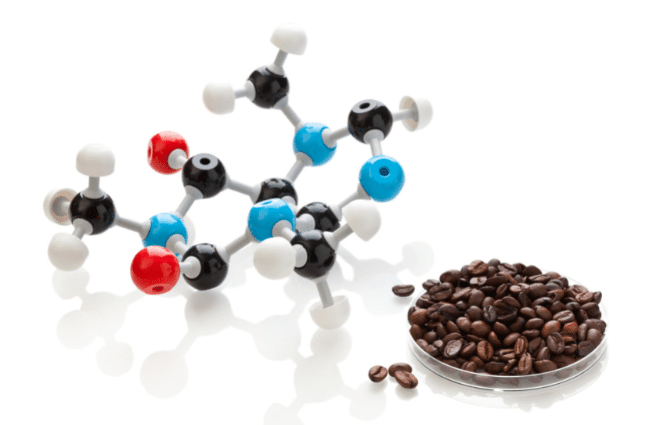
What better way to start the day than with a cup of fresh coffee, right? Ahhh, I can smell it brewing, just like the vast majority of the world, every morning, afternoon, and evening.
It’s no wonder our bodies can’t fully rest!
If there’s one thing I have learned, it’s that food, in this case caffeine, is very bio-individual, which means that some people’s bodies can handle more caffeine than others.
The average American consumes 3 ½ cups (28 oz) of coffee per day! That is the equivalent of 336 milligrams of caffeine a day from coffee alone.
According to the Institute of Integrative Nutrition and the MayoClinic, an average of 400 mg of caffeine per day is acceptable for a healthy adult; however, once 500-600 mg of caffeine is consumed, adverse side effects may occur.
In addition, every individual’s response to caffeine is unique and will differ from person to person.
- How much caffeine do you consume daily?
- Is that amount of caffeine working for you?
- Are you able to sleep at night?
- Do you ever feel anxious?
- How about exhaustion; ever get that drowsy feeling throughout your day?
Coffee contains phytonutrients that help stabilize free radicals in the body, prevent tumor growth, assimilate vitamin C, and provide a small amount of magnesium, potassium, and niacin.
Consuming some caffeine in the diet can also improve athletic performance and increase focus.
While there are many benefits of coffee itself, like anything else, when caffeine is consumed in excessive amounts, it may cause the user to also experience the negative side effects.
Caffeine pumps adrenaline into the body, activating the adrenal glands in a way they naturally wouldn’t operate and eventually resulting in adrenal exhaustion.
When this excess amount of caffeine is absorbed into the body, it may lead to a slight reduction in bone density and increase:
- Anxiety
- Irritability
- Jitteriness
- Nausea
- Insomnia
- Gastrointestinal Distress
- Rapid Heartbeat
- Risk of Coronary Heart Disease
Simply put, our bodies were not designed to operate on overdrive for 60 hours a week.
By stimulating the adrenals, caffeine increases a person’s heart rate and, at the same time, can increase a person’s exhaustion.
When you combine excessive amounts of caffeine with daily living stressors, caffeine consumption can lead to excessive cortisol production and initiate a stress response that increases cortisol release, which does not support the adrenals.
When the body’s cortisol levels are elevated, this can decrease insulin sensitivity and contribute to high blood glucose, increasing the risk of type 2 diabetes and obesity.
To support the adrenals, we must reduce our caffeine consumption.
What is Mushroom Coffee?

Mushroom coffee can be sourced in two main ways:
- Combining ground and dehydrated functional mushrooms (in powder or extract form)
- Functional mushrooms are medicinal mushrooms that grow in the wild, provide an array of health benefits, and are widely used for medicinal purposes (these include but are not limited to reishi, chaga, lions mane, cordyceps, etc.).
- These mushrooms produce a nutritional value much greater than a traditional button mushroom found in your local grocery store.
- Blended with ground coffee or blended functional mushrooms without coffee beans.
MUDWTR offers a coffee alternative that contains 1/7th of the caffeine of coffee and is combined with powders from various medicinal mushrooms without the addition of coffee beans.
These mushrooms provide natural energy and focus without jitters or a sugary crash that excessive amounts of caffeine may cause.
FourSigmatic, on the other hand, has a variety of blends that combines both ground coffee with various mushroom extracts (depending on the blend).
How to Choose the Right Mushroom Coffee
Although mushrooms are a great alternative to reduce caffeine intake, to maximize the benefits of fungal products (including chaga, reishi, lions mane, cordyceps powders, etc.), mushrooms should be boiled at minimum for one to two hours, and even hour-long boiling only gets a partial extraction.
The downfall of mushroom coffee is that a minimal amount of the beneficial chemicals are extracted from dried mushrooms by merely steeping them in hot water for a few minutes.
Since mushroom coffee products are only steeped for a few minutes, most beneficial chemicals remain in the powder and are not ingested by the consumer.
The only way around the problem of partial mushroom extraction is to start with an extract and use it as an ingredient in the mushroom coffee.
That means it is essential to pay close attention to the ingredients of products.
If the product contains raw powders rather than extracts, they are primarily a placebo and confer little to no benefit.
The more extracts used, the more beneficial the product is.
Health Benefits of Mushrooms
Functional mushrooms help fight and manage stress due to their adaptogenic properties, which support the adrenal glands and mitigate caffeine’s jittery side effects.
In addition, mushrooms have various health benefits, containing antioxidants, prebiotics, and polysaccharides that support digestion, the immune system and contribute to healthy bacteria in the gut.
Other compounds found in mushrooms serve as probiotics, which allow the body to digest foods without extracting fats in the food and storing it as fat on the body.
Some mushroom species also contain beta-glucans, a type of soluble dietary fiber essential to improve cholesterol, boost heart health, regulate blood sugar, and reduce the risk of type 2 diabetes [1].
Various bioactive compounds found in mushrooms could prevent oxidative stress (an imbalance in the body between antioxidants and free radicals, which fight off pathogens) and act as chemopreventive agents (substances containing anticancer properties) to prevent diabetes, obesity, cardiovascular disease, and neurodegenerative diseases [2].
In addition, mushrooms also contain prebiotics to help control obesity and may even delay the onset of dementia & Alzheimer’s disease [3].
Mushrooms also reduce inflammation and have far less caffeine than coffee.
Additional Benefits of Mushrooms:
- Antiviral
- Gut-Friendly
- Supports the liver & flushes toxins
- Fat-Free
- Low-Sodium
- Cholesterol-Free
- Low-Calorie
- Full of Fiber & Protein
- Improves Blood Circulation
- Improves Sleep & Skin Issues
- Decreases Stress & Anxiety
- Plant-Based Meat Alternative
- Blood Pressure Control
- Provide energy from protein, carbohydrate, and fat breakdown [4]
- Rich in vitamins & protects heart health [4]
- Vitamin B
- Riboflavin – red blood cells
- Niacin – improves the digestive system & helps to maintain healthy skin
- Pantothenic Acid – improves nervous system function & helps the body make hormones it needs
- Potassium – essential for heart, muscle, & nerve function
How Mushrooms Specifically Target & Aid In Weight-Loss, Brain Functioning, & Increased Energy
The most common combinations in mushroom coffee are lions mane, chaga, reishi, and cordyceps.
Lions Mane
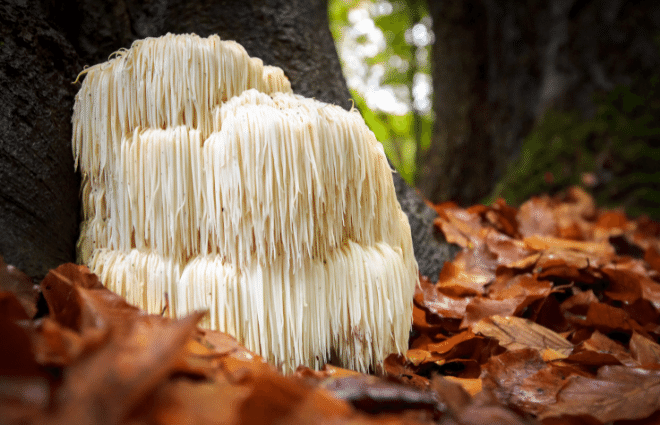
- Supports cognitive function & mental performance
- Improves memory, thinking, focus, & creativity
- Stimulates nerve growth (neurogenesis)
Chaga
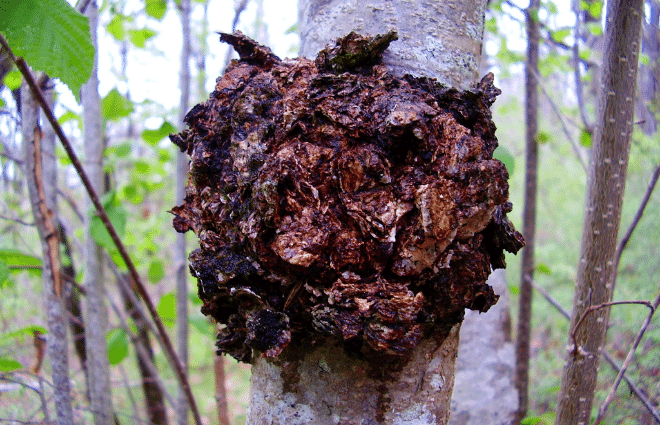
- Contains antioxidant properties, phytonutrients, vitamins, & minerals
- Supports immune function & overall well-being
- Improves respiratory function
- Raises blood oxygen levels
- Contains alkaline minerals to balance coffee acidity (if combined with coffee)
Reishi
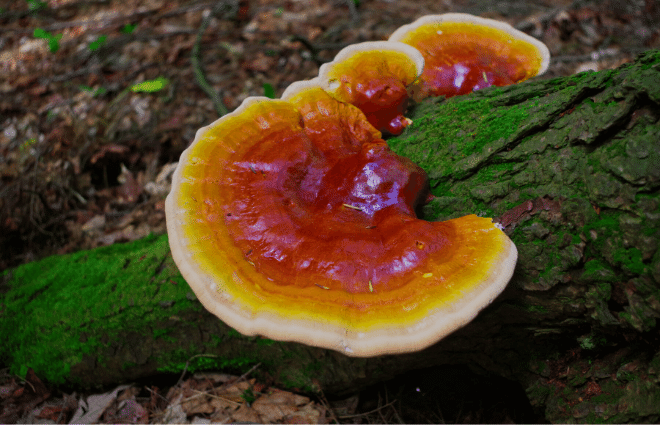
- “King of Mushrooms”
- Adaptogenic qualities
- Calming effects
- Contains powerful immune properties, referred to as immune “modulators” (which contain polysaccharides & beta-glucans)
- Improves cardiovascular function
- Anti-cancer properties
- Could fight fatigue & depression
- Anti-inflammatory effects
- Protect the liver
- Help to control blood sugar levels
Cordyceps
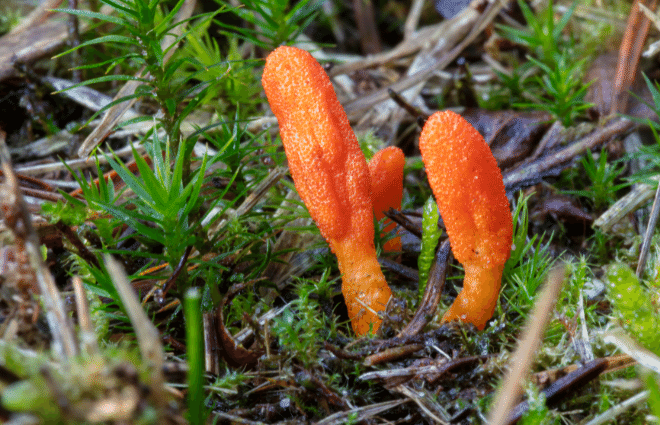
- Strong antioxidant properties
- Help to support healthy energy levels
- Improves athletic performance, endurance, & stamina
- Oxygenates the body
- Help the body to produce energy through ATP
- Realigns gut bacteria
- Aids weight loss
How To Implement Mushroom-Coffee Into Your Daily Routine/Lifestyle
The easiest way to make a healthy change stick is to work it into your daily routine.
Whether you start your day slowly with quiet meditation, or maybe with a little morning yoga, find a natural place in your day to add a cup of mushroom coffee.
Then, evaluate the role caffeine plays in your life.
If you constantly need caffeine throughout the day, you may need to consider making some adjustments–like reducing caffeine intake by switching your coffee for mushroom coffee, or starting a gentle yoga routine–to help naturally balance your energy levels.
Remember, the effects that different foods, beverages, etc., have on your body are entirely bio-individual, and it’s your responsibility to become aware, listen, and learn how your body feels and is affected by these factors.
Caffeine is highly bio-individual. Begin to observe your body and the way it feels, not just immediately before or after consumption, but throughout your entire day, into the evening, and even at night.
Although I consciously know I may not be receiving the “maximum” benefits from the mushrooms themselves, mushroom coffee is an excellent alternative, and I love being able to enjoy a cup of “mushroom coffee” in the mornings without having heart palpitations throughout the day.
I knew that my body was not meant to function feeling the way it did, so I made the switch – and so can you!
The prep time is generally the same as brewing coffee. Here’s how I like to drink mine:
Step 1: Boil H2O
Step 2: Add hot water to a glass mug
Step 3: ADD –
1 scoop of mushroom coffee
1 scoop of MCT powder
1 scoop of vanilla collagen + dermaval
Step 4: Use an electric frother to mix
Step 5: Let cool & sip
Make it your own to enjoy – add honey, agave, almond or cashew milk, etc.!
Explore yourself!
Get creative & have fun with this beauty of nature!
Figure out what you enjoy & what works best for your body!
Listen & observe how your body feels before, during, & after a meal – this will help bring awareness to what you consume & the effects different foods have on your body.
References
- Mgbekem, M. A., et al. “Knowledge and Utilization of Mushroom as a Food Supplement among Families in Selected Local Government Areas of Cross River State, Nigeria.” Food and Nutrition Sciences, Scientific Research Publishing, 6 Nov. 2019, www.scirp.org/journal/paperinformation.aspx?paperid=96350#ref17.
- Ganesan, Kumar, and Baojun Xu. “Anti-Obesity Effects of Medicinal and Edible Mushrooms.” Molecules (Basel, Switzerland), MDPI, 5 Nov. 2018, www.ncbi.nlm.nih.gov/pmc/articles/PMC6278646/#B62-molecules-23-02880.
- Feeney, Mary Jo, et al. “Mushrooms and Health Summit Proceedings.” The Journal of Nutrition, American Society for Nutrition, July 2014, www.ncbi.nlm.nih.gov/pmc/articles/PMC4056650/#bib40.
- Mgbekem, M. A., et al. “Knowledge and Utilization of Mushroom as a Food Supplement among Families in Selected Local Government Areas of Cross River State, Nigeria.” Food and Nutrition Sciences, Scientific Research Publishing, 6 Nov. 2019, www.scirp.org/journal/paperinformation.aspx?paperid=96350.
About the Guest Author

I’m Megan Adolph, the operator & founder of Wholistic Wanders, but call me Megg! I grew up as a competitive gymnast, traveling around America, intrigued by what the world has to offer. I am a Certified Holistic Health Coach with a Bachelor’s Degree in Exercise Science; I have specialized in training clients of multiple age demographics for many years, both in personal & group settings. Be sure to read up on “My Story” to learn how I can better serve you!

Great guest post! So much I didn’t know about! Being in the health and wellness space myself, it is good when you come across rare information such as this, it is such a winning find! Great job!